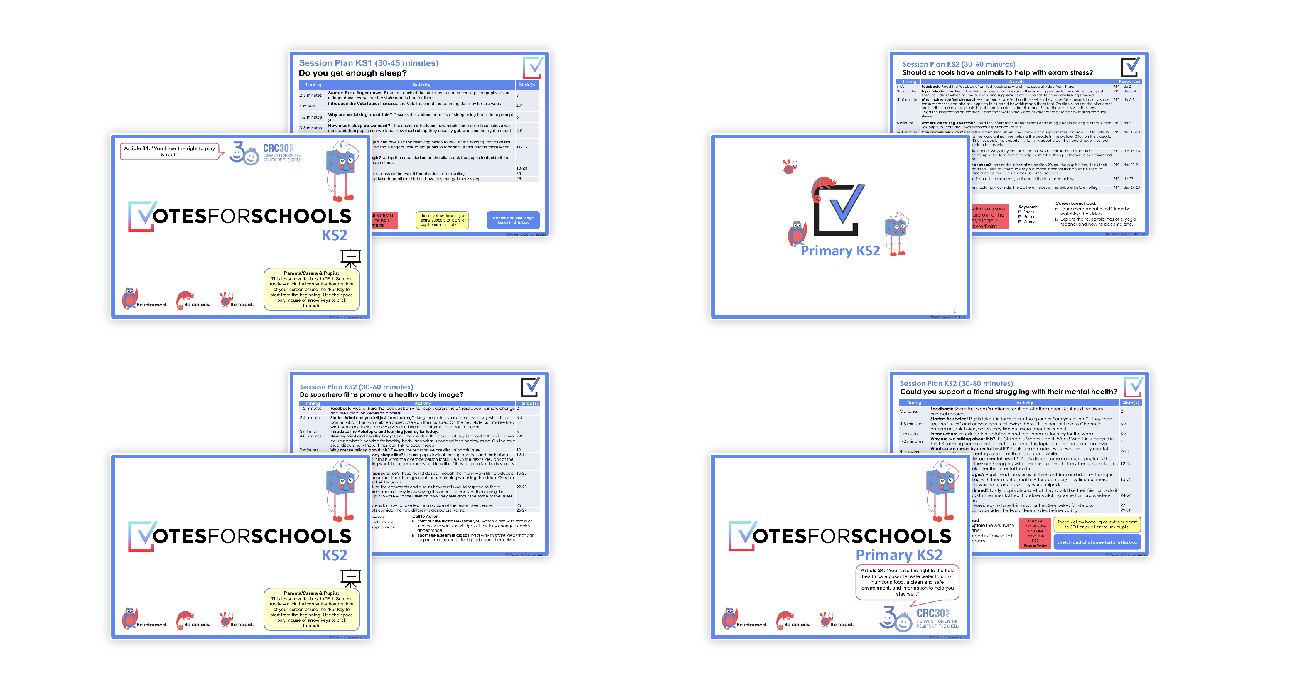Mental Health
Unit
ELA
+1
Social Studies
2nd Grade - 5th Grade
Votes For Schools
ELA Unit Description
Editable presentation
Good for assemblies
Group work
Discussion based learning
In this unit on Mental Health from Votes for Schools, students will explore the following topics: Comparing ourselves to others, Should children keep up with the news, Should schools have pets to help with stress, Do you get enough sleep, Friends and mental health, Is gaming good for you, Nature and mental health, Do you get enough sleep, Should schools have pets to help with stress, Superheroes and body image, Friends and mental health, Is gaming good for you, Nature and mental health, Should children keep up with the news
Unit contents
Lessons

Are you comfortable talking about loneliness?
Lesson
Social Studies
2nd Grade - 5th Grade
In this Key Stage 2 (Elementary School) lesson on - Are you comfortable talking about loneliness?, voters are discussing the theme of loneliness and its links to our wellbeing. The lesson gives voters an insight into the facts behind the “loneliness epidemic” in the UK, as well as allowing them to consider what they would do to tackle the issue in their own lives. Voters will then decide: “Are you comfortable talking about loneliness?”

1. Do you get enough sleep
Lesson
ELA
+1
2nd Grade - 5th Grade
In this Key Stage 1 (Elementary School) lesson on - Do you get enough sleep, For Mental Health Awareness Week, students decide whether they need to change their sleeping patterns, and explore the side effects of a lack of sleep.

2. Should schools have pets to help with stress
Lesson
ELA
+1
2nd Grade - 5th Grade
In this Key Stage 1 (Elementary School) lesson on - Should schools have pets to help with stress, students discuss the benefits and drawbacks of schools having pets to help with student stress. They look at ways animals can help with stress as well as thinking strategies students already use to relax.

3. Superheroes and body image
Lesson
ELA
+1
2nd Grade - 5th Grade
In this Key Stage 1 (Elementary School) lesson on - Superheroes and body image, Students explore the impact comparing ourselves to those on screen can have on our self-esteem.

4. Friends and mental health
Lesson
ELA
+1
2nd Grade - 5th Grade
In this Key Stage 1 (Elementary School) lesson on - Friends and mental health, students explore the idea of putting their own mental health first. They think about whether you should always put your friends first or not.

5. Is gaming good for you
Lesson
ELA
+1
2nd Grade - 5th Grade
In this Key Stage 1 (Elementary School) lesson on - Is gaming good for you, Students discuss the benefits and drawbacks of gaming.

6. Nature and mental health
Lesson
ELA
+1
2nd Grade - 5th Grade
In this Key Stage 1 (Elementary School) lesson on - Nature and mental health, students explore the relationship between nature and mental health and explore ways that nature can be beneficial to their mental health.

7. Should children keep up with the news
Lesson
ELA
+1
2nd Grade - 5th Grade
In this Key Stage 1 (Elementary School) lesson on - Should children keep up with the news, students examine what they think the news is and then consider whether or not they want to know the news.
Unit contents
Lessons

Are you comfortable talking about loneliness?
Lesson
Social Studies
2nd Grade - 5th Grade
In this Key Stage 2 (Elementary School) lesson on - Are you comfortable talking about loneliness?, voters are discussing the theme of loneliness and its links to our wellbeing. The lesson gives voters an insight into the facts behind the “loneliness epidemic” in the UK, as well as allowing them to consider what they would do to tackle the issue in their own lives. Voters will then decide: “Are you comfortable talking about loneliness?”

1. Do you get enough sleep
Lesson
ELA
+1
2nd Grade - 5th Grade
In this Key Stage 1 (Elementary School) lesson on - Do you get enough sleep, For Mental Health Awareness Week, students decide whether they need to change their sleeping patterns, and explore the side effects of a lack of sleep.

2. Should schools have pets to help with stress
Lesson
ELA
+1
2nd Grade - 5th Grade
In this Key Stage 1 (Elementary School) lesson on - Should schools have pets to help with stress, students discuss the benefits and drawbacks of schools having pets to help with student stress. They look at ways animals can help with stress as well as thinking strategies students already use to relax.

3. Superheroes and body image
Lesson
ELA
+1
2nd Grade - 5th Grade
In this Key Stage 1 (Elementary School) lesson on - Superheroes and body image, Students explore the impact comparing ourselves to those on screen can have on our self-esteem.

4. Friends and mental health
Lesson
ELA
+1
2nd Grade - 5th Grade
In this Key Stage 1 (Elementary School) lesson on - Friends and mental health, students explore the idea of putting their own mental health first. They think about whether you should always put your friends first or not.

5. Is gaming good for you
Lesson
ELA
+1
2nd Grade - 5th Grade
In this Key Stage 1 (Elementary School) lesson on - Is gaming good for you, Students discuss the benefits and drawbacks of gaming.

6. Nature and mental health
Lesson
ELA
+1
2nd Grade - 5th Grade
In this Key Stage 1 (Elementary School) lesson on - Nature and mental health, students explore the relationship between nature and mental health and explore ways that nature can be beneficial to their mental health.

7. Should children keep up with the news
Lesson
ELA
+1
2nd Grade - 5th Grade
In this Key Stage 1 (Elementary School) lesson on - Should children keep up with the news, students examine what they think the news is and then consider whether or not they want to know the news.
Unlimited access to 30,000+ resources
All subjects
National Curriculum Coverage
Award-winning content
This website uses cookies to enhance the user experience.
To get more information about these cookies check our

